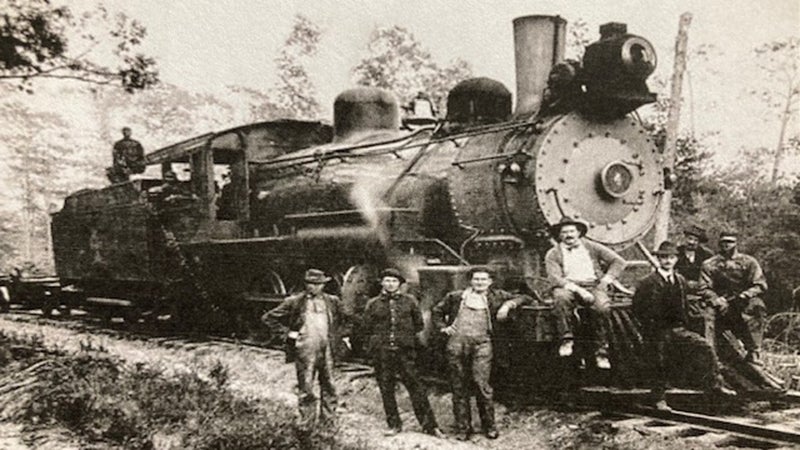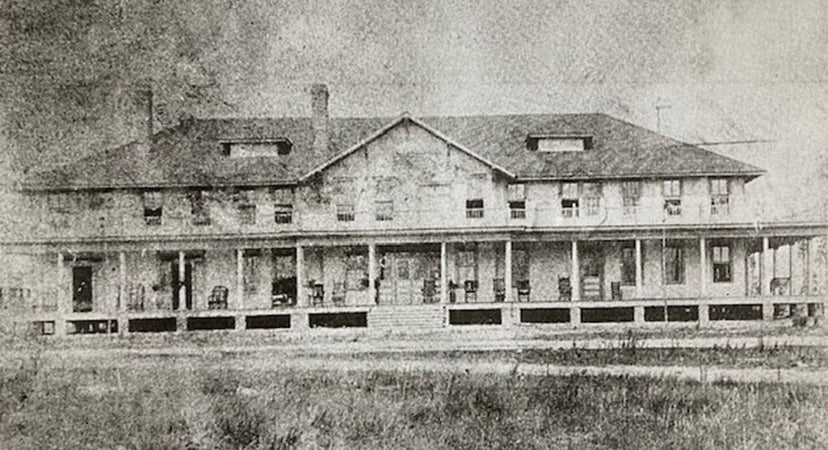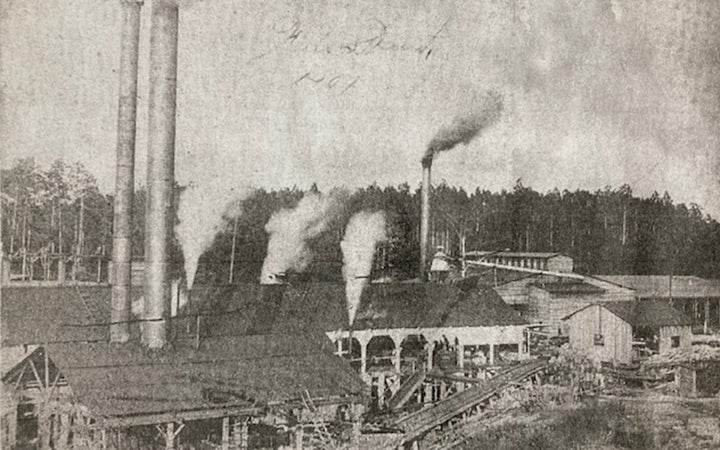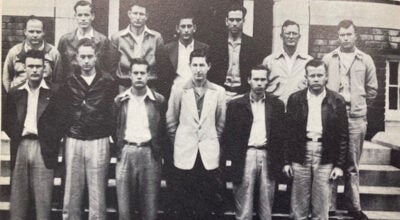Remember When: Covington County’s only ghost town
Published 2:00 pm Friday, May 19, 2023

- The Huge Iron Horse in the Woods near Falco - Circa 1910 (PHOTO PROVIDED)
|
Getting your Trinity Audio player ready...
|
Located in the southwest section of Covington County is an unincorporated community that authors Gus and Ruby Bryan referred to in their book Covington County History 1821-1976 as Covington County’s “only true ghost town.”
Its name is an acronym for the Florida-Alabama Land Company, FALCO, which harvested timber in the area from around 1903 until 1925. The town south of Andalusia was founded by some business men, bankers, attorneys, and others from Pensacola who were cutting high grade virgin timber and floating it down the river to Pensacola. It is said that J. H. Givens of Laurel Hill, Florida and Alex Givens of Bradley, Alabama formed a development company to build a sawmill. They incorporated the place after which they surveyed and named the streets.
Falco became a thriving sawmill town of several hundred residents with a large business section which housed some fine brick buildings and nearby homes. The community was home to not only a sawmill but also the Falco Bank, the Falcola Bottling Company, a 40-room hotel, the John Stokes grist mill, and some general stores including a hardware store, several grocery stores, and a drug store.
The Falco Post Office was established in 1903 with postmasters serving the community until around 1955. Even a Masonic Lodge was built, a two-story wooden building.
The grist mill on the dam of the Stokes Mill Pond was where people would bring corn to be water ground into meal and grits. A drink similar to Coca Cola was bottled there around 1910-1915 by Dan Stokes. The soda pop was sold not only in Falco but in the surrounding countryside delivered by mules and wagon. The company prospered until Coca Cola and Royal Crown Cola found a way into Falco.
The hotel had a huge dining room in which monthly dances were held. Orchestras arrived by train from Pensacola to entertain.
There were several physicians at Falco including Dr. H. W. Waters who was appointed the Mill Doctor, a position he kept until 1925. He and his family moved to Opp in 1926 when the town began declining. Before leaving Falco, he had planted vast acreages in pecan trees. Waters is still known as the “father of pecans” in the south part of Covington which is now known as the pecan center of South Alabama. Because there were no hospitals closer than Pensacola in those early days, patients who needed surgery often had to be taken there by train.
The flu epidemic of 1918 hit hard in Falco including a World War I soldier returning from the war. Many of the men employed at the mill left to serve in the military. A typhoid epidemic followed in 1919.
Falco also had two policemen (Will and Rube Hart), a dentist (Dr. Robinson), a postmaster (J. W. Miles), and a mayor (Hilary Thompson).
A railroad depot sat near the logging railroads which connected the Central of Georgia and L & N lines.
The McGowin-Foshee Lumber Company purchased the Fla. Ala. Land Co. sawmill and 13,000 acres of timberland around 1910. Homes were built by the partners for mill workers along with a modern office. Their logging camp consisted of 8 or 9 railroad cars including a tool and blacksmith store car with office, a cook car, a dining car, and sufficient sleeping cars. When the timber was exhausted within a certain area of several square miles, the camp was extended to the next block of timber with the camp cars moved to the new location.
Many old photographs exist today of the huge iron horse locomotives on tracks bringing logs out of the woods to the giant sawmill which spawned a town of some 1,000 people until a tragic fire event in the early 1920s according to some accounts.
It was, however, reported in the Bryan book that on July 3, 1917 (This date cannot be confirmed.), a fire broke out in the boiler room of the huge lumber mill almost completely destroying the mill and the town. It is remembered that this occurred while many of the employees and citizens were attending a picnic at Beda Church. Much of the lumber was destroyed and the company decided to move the salvage to Bradenton, Florida.
At any rate, by 1925, the timber was gone. Many of the workers followed the company while others went to Opp where cotton mills operated and jobs were available. Houses were sold or moved to various places. The Covington Hotel in Opp was built from the lumber dismantled from the Falco Hotel.
Gus Bryan stated in his 1976 book that descendants of the families still live in the Falco and Wing areas of the county. Their children who went to the Falco School have made their marks in many outstanding ways in education and business. The school was known to have one of the best schools in the county. All of the teachers had college degrees and were well thought of.
Falco School was originally known as Stokes School and had a term of four months. Even though it was first located near the Stokes Grist Mill which was in operation during the Civil War, the school was moved to Falco in 1905 and was made a three-teacher school. In 1908, it was moved to Silver Springs but later moved back to Falco. By 1928-29, it was consolidated with other area schools, and by 1950, there were five teachers offering instruction through the eighth grade. A large school building with seven classrooms and an auditorium was completed in 1940. The faculty was composed of a principal and teachers.
In addition to the prominent families noted who lived in Falco, Bryan mentioned the extensive cattle raising which thrives in and around Falco today with lush pastures in pecan orchards which are beautiful scenes.
Even though the infamous fire which destroyed the sawmill resulted in the decision to “not rebuild” and ultimately, the community to become extinct, Falco’s history is one of pride for this part of southwest Covington County with mostly old timers who Remember When they reflect on the story of the abandoned town when the logging industry flourished then declined.
Sue Bass Wilson, AHS Class of 1965, is a former choral music teacher, real estate broker, and long-time member of the Covington Historical Society. She can be reached at suebwilson47@gmail.com.




